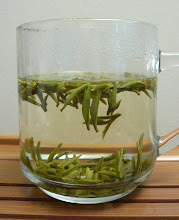What's GABA? - GABA is gaba-aminobutyric acid. It's briefly called GABA. It's an amino acid that plays important role in nervous system and endocrine system. There are many medical research on health benefits of GABA as dietary supplement. I didn't look into them, because I always think human body is an extremely complicated system, and dietary supplements to human body are seldom as simple as gasoline to cars (well some dietary supplements, such as some vitamins, do have more straight-forward effects).
So health benefit is not the main purpose that I got this tea. It's a nice bonus if it's super healthy, but I think a tea should first be tasty.
Tea leaves with rich GABA contents were first discovered by Japanese tea biochemists. Then Japanese tea professionals started to intentionally cultivate and process tea leaves to promote their GABA contents. The tea leaves are slowly oxidized in an environment with very little oxygen. This is very different from the regular oxidation of tea (I have to say Japanese sometimes are extremely creative). This special process can result in a tea with more than 150mg of GABA content in every 100g tea, which is the standard for GABA tea.
According to some Japanese studies, GABA tea has many health benefits, reducing blood pressure, cardiovascular disease prevention, slimming, liver health... just to name a few. I didn't read much about these benefits but I felt the benefits covered medical conditions of everybody in my family :-p
There are organic and non-organic GABA teas. I got this MOA certified organic one. But the main reason I got this tea is, a few people mentioned to me that this tea tastes somewhat like Oriental Beauty and is more tasty than other GABA teas (some say the special processing causes GABA tea to have less aroma), which I like very much.
I brewed this tea in both gongfu style and with a small tea bowl. The tea does have some honey and fruit aroma similar to Oriental Beauty, but not as prominent as the aroma of OB. I think an obviously feature of this GABA tea is, it tastes very smooth and sugary - a strong sugar taste minus the sweet part. It may fit the tastes of people who love Oriental Beauty, Muzha Tie Guan Yin and/or black tea, although its flavor is not exactly the same as any of them. In later infusions of gongfu style, this tea yield some taste of herbal medicine. Overall, the front taste of this tea is rich, but aftertaste is weak or none. The tea does well in tea bowl or mug brewing. When using a mug, 10-15 dry tea grains can make a good mug of tea with about 3 infusions. Compared with most other oolongs, the tea releases flavor faster, therefore less tea can be used for each session. On the other hand, in mug brewing, the tea gets weak at about the fourth infusion, not as long lasting as many other oolongs.
I am not sure yet if I am fond of the concept of promoting specific healthy content in tea. But it's an interesting phenomenon to observe. Besides the GABA concept in this tea, something else about this tea that attracts me is, the producer tried all means (including adjusting ingredient of organic fertilizers and modifying the procedure within GABA standards) to make the tea tasty. I don't think it's as tasty as my favorite Oriental Beauty, but it does have some good taste. I don't want to drink a tea solely for its health benefits, and I am glad the producer thinks the same way!
六堡茶道美学煮茶
3 years ago































No comments:
Post a Comment